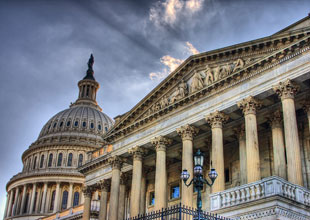I have a new article up this morning on what we know about the pending climate and energy legislation in the Senate from John Kerry (D-Mass.), Lindsey Graham (R-SC) and Joe Lieberman (I-Conn.). What we know, in short, is that climate goals will likely be scaled back in order to gain support, and that even with lowered ambitions it still faces an uncertain future in the upper chamber.
Despite the irresolution, 22 senators sent a letter to Majority Leader Harry Reid yesterday calling for a floor vote on comprehensive legislation this year.
“[W]e believe the United States Senate should consider bipartisan and comprehensive clean energy and climate legislation this year with a renewed focus on jobs and reduced dependence on foreign oil,” wrote the senators, who represent a range of regional interests, including coal and manufacturing states. “Our lack of a comprehensive clean energy policy hurts job creation and increases regulatory uncertainty throughout our economy. Businesses are waiting on clear signals from Congress before investing billions in energy, transportation, manufacturing, buildings and other sectors. America’s competitiveness and export strength are also at stake.”
Signing on to the letter: Mark Begich of Alaska, Michael Bennet of Colorado, Sherrod Brown of Ohio, Roland Burris of Illinois, Maria Cantwell of Washington, Tom Carper of Delaware, Robert Casey of Pennsylvania, Al Franken of Minnesota, Kay Hagan of North Carolina, Tom Harkin of Iowa, Ted Kaufman of Delaware, Amy Klobuchar of Minnesota, Jeff Merkley of Oregon, Patty Murray of Washington, Jeanne Shaheen of New Hampshire, Arlen Specter of Pennsylvania, Debbie Stabenow of Michigan, Jon Tester of Montana, Mark Udall of Colorado, Tom Udall of New Mexico, Mark Warner of Virginia, and Ron Wyden of Oregon.
Kerry, Graham, and Lieberman may release a more detailed outline of their legislation as early as this week, with legislative text expected after the Easter recess. The trio shared some specifics about the legislation with industry and environmental groups last week, and will meet with a larger group of senators this afternoon to discuss details.
When (or if) a climate and energy package would go to a vote remains unclear. As of yet, there’s not actual legislative text, and the Environmental Protection Agency would need five to six weeks to evaluate the both the environmental and economic impacts of the bill before it could go to the floor. According to Democratic sources in the Senate, financial reform is expected to come before climate and energy, and it’s possible that immigration could also come precede the Kerry-Graham-Lieberman bill on the legislative calendar.














